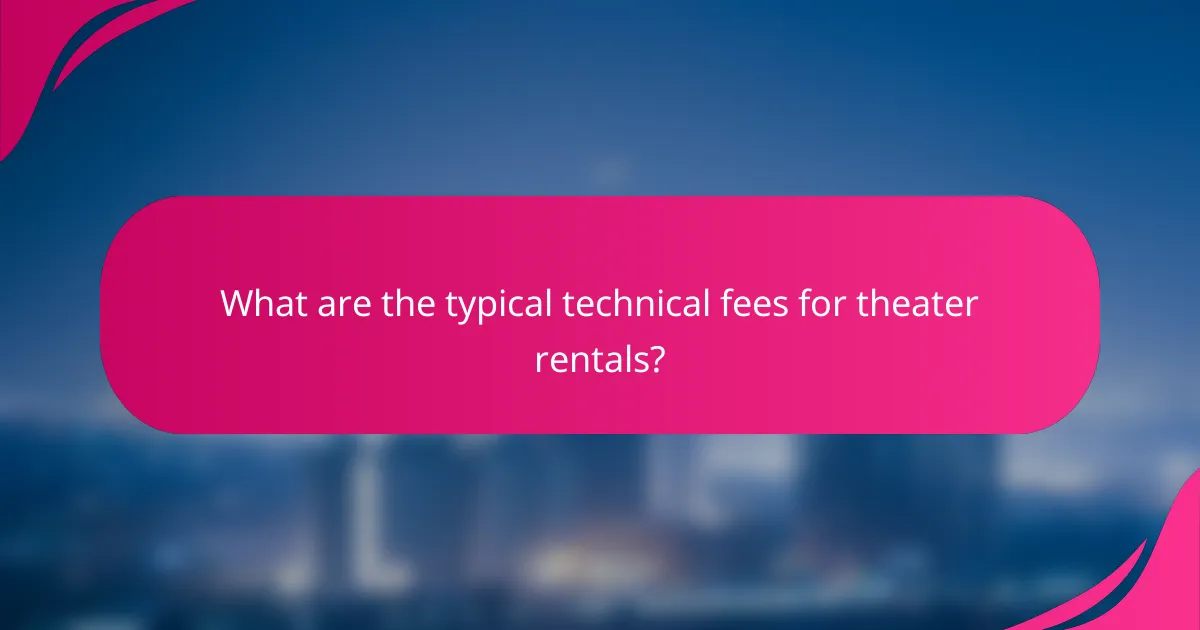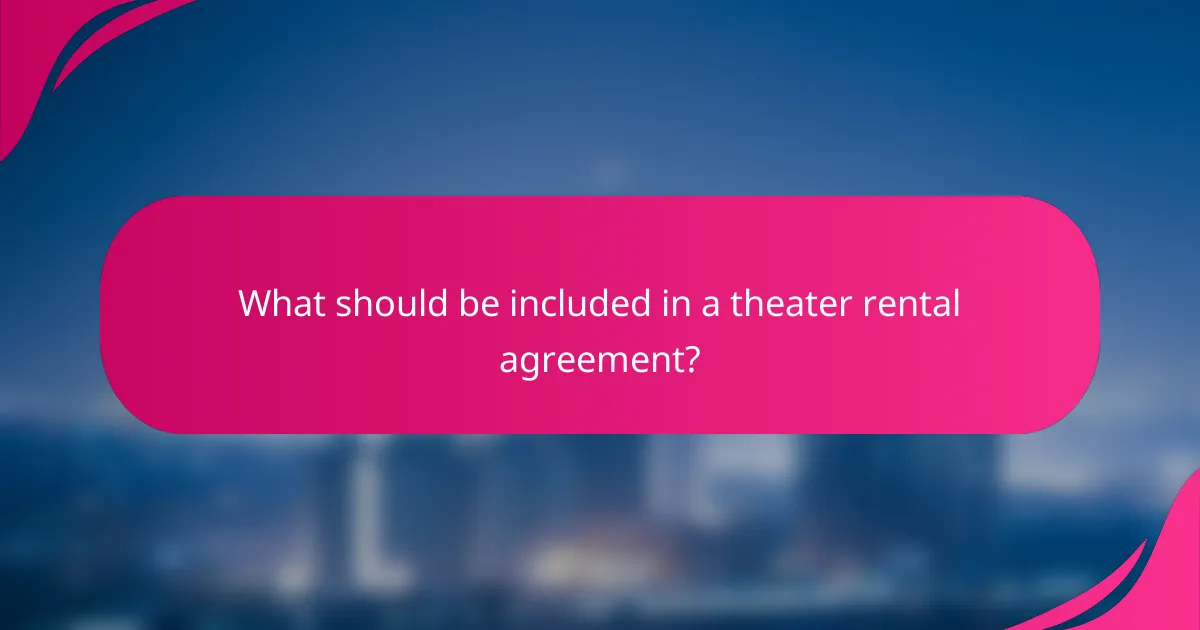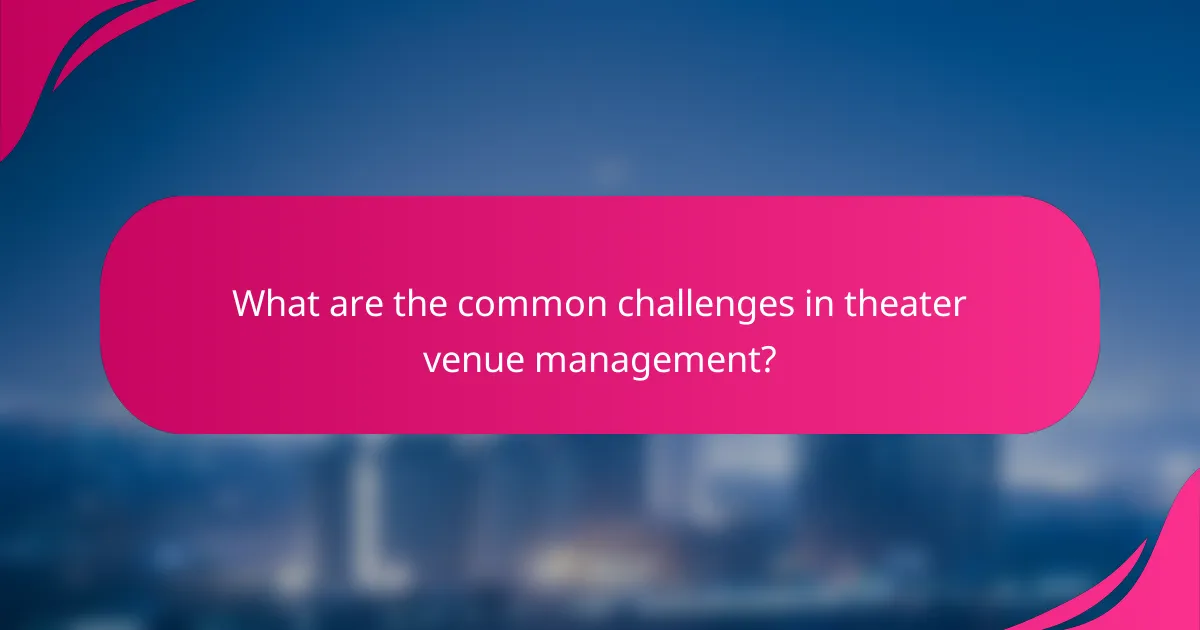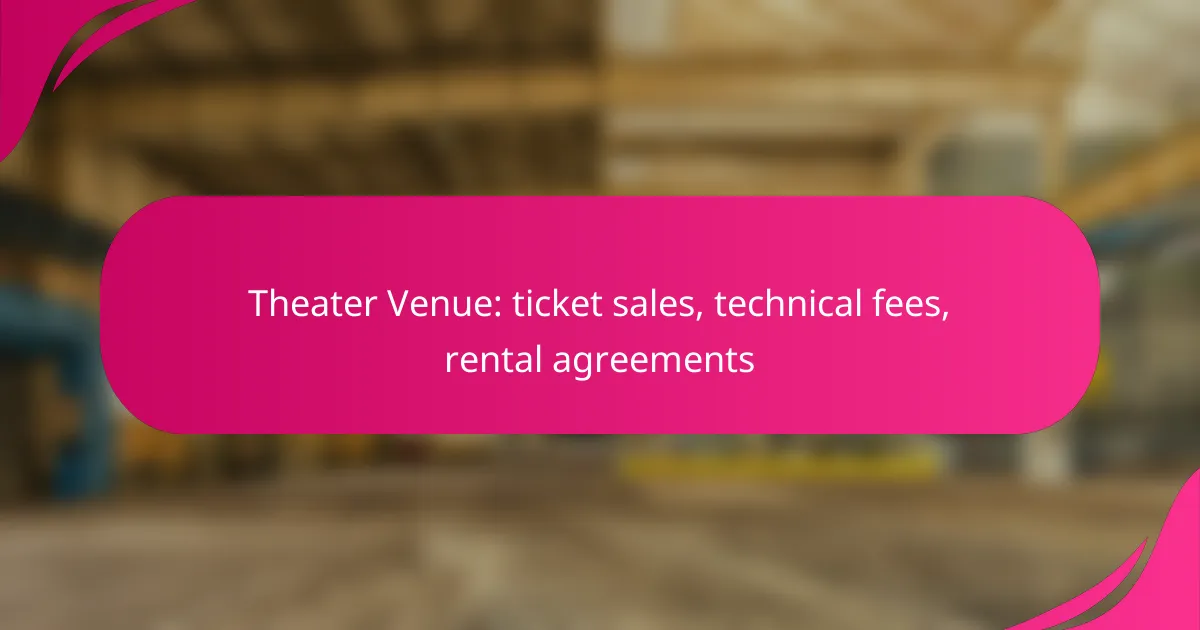Effective ticket sales for theater venues in London require a strategic blend of online platforms, box office systems, and collaborations with ticket resellers to enhance accessibility for audiences. Additionally, understanding the technical fees associated with rentals, which cover essential equipment and setup costs, is crucial for budgeting. A well-defined rental agreement is essential to clarify terms of use, pricing, and responsibilities, helping to prevent misunderstandings between the venue and the renter.

How to sell tickets for theater venues in London?
To sell tickets for theater venues in London, utilize a combination of online platforms, box office systems, and partnerships with ticket resellers. This approach maximizes reach and simplifies the ticketing process for both venues and customers.
Online ticketing platforms
Online ticketing platforms are essential for selling theater tickets efficiently. Popular options in London include Ticketmaster, Eventbrite, and See Tickets, which allow venues to list events, manage sales, and track attendance. These platforms often charge a service fee, typically ranging from 5% to 15% of the ticket price.
When choosing a platform, consider factors such as user interface, payment processing fees, and customer support. Some platforms offer promotional tools to help boost sales, which can be beneficial for attracting larger audiences.
Box office management systems
Box office management systems streamline ticket sales directly from the venue. These systems, like Spektrix or Tessitura, provide comprehensive tools for managing ticket inventory, processing transactions, and generating sales reports. They can integrate with online platforms for a unified sales approach.
Investing in a reliable box office system can enhance customer experience by reducing wait times and improving service efficiency. Ensure the system supports various payment methods and offers real-time analytics for better decision-making.
Partnerships with ticket resellers
Partnering with ticket resellers can expand your theater’s reach beyond direct sales. Resellers like StubHub or Viagogo allow you to tap into their established customer base, increasing visibility for your events. However, be aware that resellers typically charge a commission on sales, which can affect your profit margins.
When forming partnerships, negotiate terms that align with your venue’s goals, and ensure that the reseller’s audience matches your target demographic. Monitor sales performance through these channels to assess their effectiveness and adjust strategies as needed.

What are the typical technical fees for theater rentals?
Technical fees for theater rentals typically include costs associated with audio-visual equipment, stage setup, and lighting. These fees can vary widely based on the venue, the complexity of the production, and the specific equipment required.
Audio-visual equipment costs
Audio-visual equipment costs can range from a few hundred to several thousand dollars, depending on the quality and quantity of the equipment needed. Basic sound systems may start around $200, while advanced setups with microphones, mixers, and speakers can exceed $2,000.
When renting audio-visual equipment, consider whether the venue provides in-house options or if you need to source from external vendors. In-house rentals often come with technical support, which can save time and ensure proper setup.
Stage setup and lighting fees
Stage setup and lighting fees typically range from $500 to $5,000, influenced by the complexity of the design and the number of fixtures required. Simple lighting setups may cost less, while elaborate designs with programmable lights and special effects can significantly increase expenses.
It’s essential to discuss your specific needs with the venue’s technical staff to get an accurate estimate. Additionally, inquire about any additional labor costs for setup and teardown, as these can add to the overall technical fees.

What should be included in a theater rental agreement?
A theater rental agreement should clearly outline the terms of use, including rental duration, pricing, liability, and cancellation policies. This ensures both the venue and the renter understand their responsibilities and rights, minimizing potential disputes.
Rental duration and pricing terms
The rental duration specifies how long the venue will be available for use, often including setup and breakdown time. Pricing terms should detail the total cost, payment schedule, and any additional fees, such as for technical support or equipment rental.
For example, a theater may charge a base rate for a four-hour rental, with additional hourly fees for extended use. It’s important to clarify whether the quoted price includes taxes and any other potential charges.
Liability and insurance clauses
Liability clauses outline the responsibilities of both parties in case of damage or injury during the rental period. Typically, the renter is responsible for any damages incurred while using the venue.
Insurance requirements may stipulate that the renter provides proof of liability insurance, covering potential accidents or injuries. This protects both the venue and the renter from financial loss due to unforeseen events.
Cancellation policies
Cancellation policies define the terms under which either party can cancel the agreement and any associated penalties. Common practices include requiring a written notice within a specified timeframe to avoid fees.
For instance, a theater might allow cancellations up to 30 days before the event with a full refund, while cancellations made less than a week in advance may incur a significant penalty. Understanding these terms helps renters plan accordingly and avoid unexpected costs.

How to choose the right theater venue for events?
Choosing the right theater venue for events involves assessing capacity, layout, and accessibility to ensure a successful experience for attendees. Consider factors like technical fees, rental agreements, and location to make an informed decision.
Capacity and layout considerations
When selecting a theater venue, capacity is crucial. Ensure the venue can comfortably accommodate your expected audience size, typically ranging from a few dozen to several thousand seats. A venue that is too large may feel empty, while one that is too small can lead to overcrowding.
Layout also plays a significant role in the audience experience. Consider the stage visibility and seating arrangement. Venues with a proscenium stage are ideal for traditional performances, while flexible spaces may suit more experimental events. Always request a floor plan to visualize how the space will work for your specific needs.
Location accessibility
Accessibility is vital for ensuring that all attendees can reach the theater venue easily. Look for locations near public transportation options, such as bus or train stations, and consider parking availability for those driving. A venue in a central area may attract more attendees compared to one in a remote location.
Additionally, ensure the venue complies with local accessibility regulations, such as wheelchair access and facilities for individuals with disabilities. This not only broadens your audience but also demonstrates inclusivity and consideration for all guests.

What are the common challenges in theater venue management?
Theater venue management faces several challenges, including staffing and scheduling issues, as well as maintaining technical equipment. Addressing these challenges effectively is crucial for ensuring smooth operations and a successful performance schedule.
Staffing and scheduling issues
Staffing and scheduling are critical components of theater venue management. Finding qualified personnel for various roles, such as stagehands, ushers, and technical staff, can be difficult, especially during peak seasons. Additionally, coordinating schedules to align with performance dates and rehearsals requires careful planning.
To mitigate staffing challenges, consider creating a flexible roster that allows for last-minute changes. Utilizing part-time staff or volunteers can also help fill gaps without significantly increasing costs. Regular communication with staff about their availability and preferences can improve overall scheduling efficiency.
Technical equipment maintenance
Maintaining technical equipment is essential for a theater’s operational success. This includes sound systems, lighting, and stage machinery, all of which must be regularly inspected and serviced to avoid malfunctions during performances. Establishing a routine maintenance schedule can help identify issues before they become critical.
Investing in quality equipment and training staff on its proper use can reduce the likelihood of technical failures. Additionally, keeping a detailed inventory of equipment and its maintenance history can assist in planning for future upgrades or replacements, ensuring that the venue remains competitive and compliant with safety standards.

How to market theater events effectively?
To market theater events effectively, focus on understanding your audience and utilizing various promotional channels. A well-rounded approach combines digital marketing, community engagement, and strategic partnerships.
Social media advertising strategies
Social media advertising is a powerful tool for promoting theater events. Platforms like Facebook, Instagram, and Twitter allow you to target specific demographics, ensuring your ads reach potential attendees who are likely to be interested in your performances.
Consider using eye-catching visuals and engaging content to draw attention. Short video clips or behind-the-scenes images can create excitement and encourage shares. Allocate a budget for paid promotions, starting with a few hundred dollars to test which ads perform best.
Regularly analyze your ad performance metrics to refine your strategy. Look for engagement rates, click-through rates, and conversion rates to determine what resonates with your audience. Adjust your campaigns based on these insights to maximize your marketing effectiveness.



